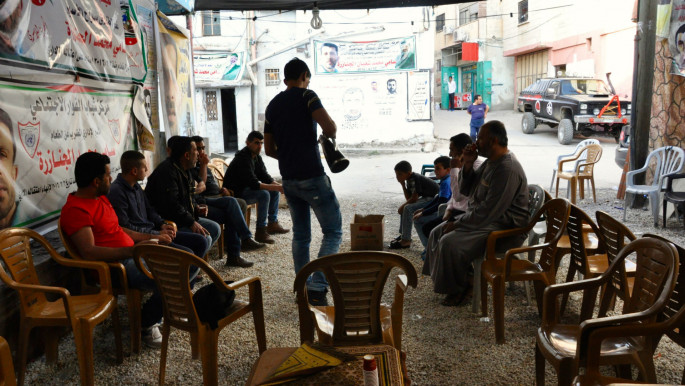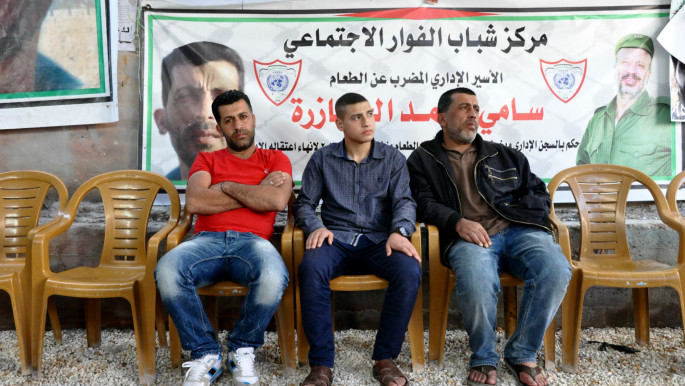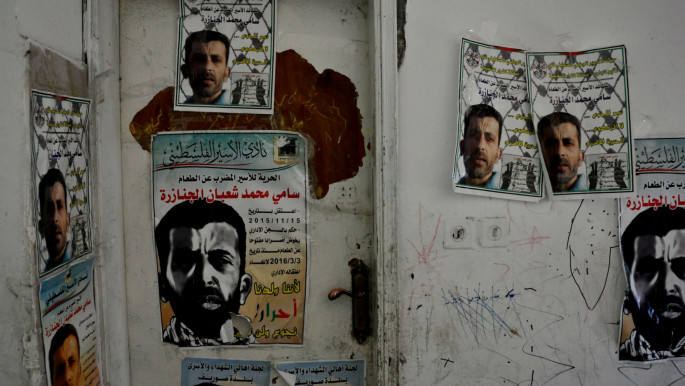Palestinian detainee ends hunger strike with shaky victory
Qadura Fares, head of the Palestinian Prisoners' Society representing Janazreh in court, told The New Arab the prosecution "failed to convince" the court that the detainee was a serious security risk warranting administrative detention, a policy wherein a detainee can be held indefinitely under secret evidence without charge.
Janazreh's status as an administrative detainee was removed, and he now faces charges of "incitement" against Israel on social media. Fares said the prosecution presented some 38 instances of alleged incitement on his Facebook page.
"I don't know what they'll decide, but at least now there will be an actual court hearing and charges," Fares said.
The 43-year-old father-of-three previously vowed not to eat until Israel removed his status as an administrative detainee by either charging or releasing him, Fares added.
Israeli forces initially removed Janazreh from his home in the occupied West Bank's al-Fuwwar refugee camp in November and placed him under administrative detention. Janazreh launched his hunger strike when an Israeli military court on March 3 renewed his administrative detention for four additional months.
 |
This is not the first time Israel has detained people for posts on Facebook - Qadura Fares, Head, Palestinian Prisoners' Society |
 |
Seventy days passed before Janazreh ate again, after the prosecution on May 11 said they held evidence against him and demanded he end his strike in order to undergo interrogation.
Janazreh agreed to suspend his strike for the seven days of interrogation, but resumed striking on May 18 when the military court gave the prosecution seven additional days for investigation.
While the court removed Janazreh's classification as an administrative detainee, Fares decried what he saw as continued arbitrary detention by Israel through the court's decision to charge his client with incitement on social media.
"Unfortunately over the last few months, this is not the first time Israel has detained people for posts on Facebook," Fares said.
"They [the prosecution] presented posts from his Facebook page, for example sharing photos of martyrs or about the intifada. But the majority of Palestinians do the same. According to these reasons, they [Israel] could arrest at least one million Palestinians," Fares said.
Laith Abu Ziad, international advocacy officer for prisoners' rights group Addameer, told The New Arab that 149 Palestinians had been charged with online incitement between October and March, in line with an increasing belief among both Palestinian and Israeli leadership that social media has played a major role in a recent upswing of violence.
"You can get detained for writing pretty much anything," said Abu Ziad, citing the detention of a number of university students for online activity.
Monday's court decision was just as bitter-sweet for lawyers and rights activists who followed his case as for the Janazreh family, who for months lived and breathed the father's case day-by-day.
"His efforts were strong, but his struggle was all of our struggle," Sami's sister-in-law, Hanna, told The New Arab.
Hanna pointed to Sami's three children, aged four, eight, and 13, who awaited calls from lawyers alongside the family's adults, suspended in the excruciating limbo of their father's hunger strike.
"Palestinian children are not like other kids, in the West, who can be distanced from problems going on in their country. Our kids live what's going on, every day," Hanna said.
Janazreh's children, along with the rest of the family and residents of the refugee camp, waited on edge as reports came through of his deteriorating health.
The detainee was transferred to Soroka Medical Center in late April after dropping to just over 100 pounds (43kg), after suffering from seizures, hypothermia, a slow heart rate and low blood pressure.
Janazreh's brother, Haitham, told The New Arab during the hunger strike that he received regular calls from his brother's lawyers, who told him Israeli guards kept the striker cuffed at his hands and feet, severely beat him and reportedly urinated in his drinking water.
Lawyers also said that Israel's prison service repeatedly transferred Janazreh from prison to prison and put him in isolation in effort to pressure him to end his strike.
Israeli Prison Service spokesperson Assaf Librati told reporters that no complaint had been filed by the detainee reporting that prison staff had urinated into his drinking water.
In response to allegations that prison officials had exercised violence, solitary confinement, and prison transfers, Librati said: "In hunger strike, there is an element of risk to life, the separation of a prisoner on a hunger strike is mainly for allow tighter control on the condition of the prisoner."
Fares said that Janazreh's hunger strike - in an unlikely subversion of Israel's power structure over Palestinians - succeeded in exposing Israel's "baseless" use of administrative detention.
However, the success of Janazreh's strike for his family and lawyers is relative - relative to the suffering endured by the striker and his family throughout his detention, and relative to the system that landed him in detention in the first place.
A day after Janazreh resumed his hunger strike last week, the UN Committee Against Torture called for an end to Israel's use of administrative detention, after rights groups argued that the policy in practice constituted a form of psychological torture.
Amnesty International early this year cited the increasing number of hunger strikers succeeding in ending their administrative detention as proof of "the bankruptcy of the administrative detention tactic" by Israel.
Despite repeated international condemnation and the increase in individual hunger strikes, 750 Palestinians remain under ongoing administrative detention.
Meanwhile, a number of Palestinians have been released from prison after undergoing gruelling hunger strikes - only to land back in prison months or years later.
Fares points out that while Janazreh's health is improving following Israel's revocation of his classification as an administrative detainee, he joins more than 7,000 other Palestinians in Israeli prisons.
For her part, Hanna's palpable joy that her brother-in-law ended his strike was laced with an underlying resentment with what she also saw as arbitrary charges.
"It's encouraging, but also not encouraging," Hanna said. "The most difficult type of injustice is the one that doesn't give you the right to defend yourself."
Follow Emily Mulder on Twitter: @Mulder_Em








 Follow the Middle East's top stories in English at The New Arab on Google News
Follow the Middle East's top stories in English at The New Arab on Google News


